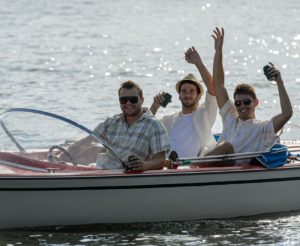
Memorial Day weekend is almost here, and for many, the holiday represents the first time they’ll be able to get their boat out on the water or up to their cottage. However, it’s also a very deadly weekend on the roads for a number of reasons:
- High number of drivers on the road.
- High speeds.
- Long weekend means more drunk driving potential.
As we mentioned yesterday, police will be out in full force looking for unbelted drivers, but they’ll also be looking for reckless, inattentive and inebriated drivers, so make good decisions on the road! But let’s get back to the main point of the blog – watercraft BWIs.
Which Watercrafts Are Subject to BWI Laws
Under Minnesota law, there are some situations where your water vessel is not subject to BWI laws. For example, if your watercraft meets any of the below specifications, you may not be subject to BWI laws:
- Anchored
- Beached
- Docked
- Being Rowed
- Bring Operated by another non-mechanical means
Now, if you’re drinking and boating and a patrol boat pulls up next to you, you can’t just throw the anchor overboard and claim to be anchored. Unlike a car, where physical control of a vehicle is more open to interpretation, you can be sitting in the captain’s chair or even manuevering a watercraft while drunk and not be subject to BWIs laws. Obviously, there are exceptions, and that doesn’t mean you’re immune from all laws. We’ll give too examples:
1. Bill and his family decide that since it’s a calm, sunny day, that they’ll play some cribbage on their pontoon boat, which is docked at their cabin. Even if Bill is intoxicated and sitting in the captain seat, he wouldn’t beat subjected to BWI laws unless he undocked his boat and took it for a spin.
2. Mandy and Sarah decide to take their canoe out for a spin after drinking some beers. Instead of staying close to shore, they navigate the lake in the wrong direction, and become a nuisance for jet skiers and boaters. A sheriff stops them. Although they can’t get a BWI because their watercraft is self-propelled, they could still be cited for recklessly piloting their canoe in the wrong direction during a busy time on the lake.
Probable Cause To Board
Lastly, one of the biggest differences between a DUI and BWI is in terms of how probable cause is determined. It is much easier to fight that an officer did not have probable cause to stop your vehicle than it is when you’re piloting a boat. That’s because an officer on land needs reasonable suspicion that you have committed a driving violation or that you may be intoxicated, whereas in a boat, a law enforcement officer is legally allowed to board your boat for security or safety reasons. If an officer who boards your boat notices empty beer cans or smells alcohol, they can begin an investigation for a BWI.
For more information on boating laws in Minnesota, check out the links below, and be sure to reach out to Avery Appelman and Appelman Law Firm if you run into any trouble this Memorial Day weekend!





